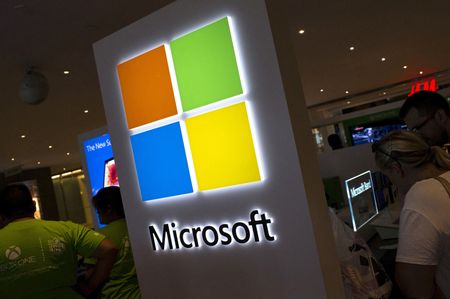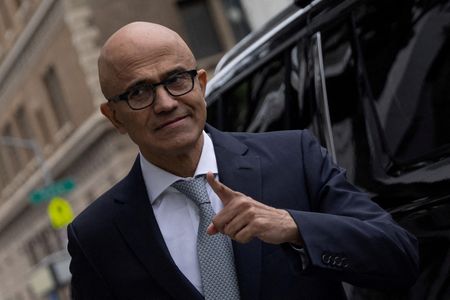By Diane Bartz
WASHINGTON (Reuters) -Microsoft chief executive Satya Nadella said Monday tech giants were competing for vast troves of content needed to train artificial intelligence, and complained Google was locking up content with expensive and exclusive deals with publishers.
Testifying in a landmark U.S. trial against its rival Google, the first major antitrust case brought by the U.S. since it sued Microsoft in 1998, Nadella testified the tech giants’ efforts to build content libraries to train their large language models “reminds me of the early phases of distribution deals.”
Distribution agreements are at the core of the U.S. Justice Department’s antitrust fight against Google. The government says that Google, with some 90% of the search market, illegally pays $10 billion annually to smartphone makers like Apple and wireless carriers like AT&T and others to be the default search engine on their devices.
The clout in search makes Google a heavy hitter in the lucrative advertising market, boosting its profits.
Nadella said building artificial intelligence took computing power, or servers, and data to train the software. On servers, he said: “No problem, we are happy to put in the dollars.”
But without naming Google, he said it was “problematic” if other companies locked up exclusive deals with big content makers.
“When I am meeting with publishers now, they say Google’s going to write this check and it’s exclusive and you have to match it,” he said.
REBUFFED BY APPLE
Nadella also testified that Microsoft had sought to make its Bing search engine the default on Apple smartphones but was rebuffed.
John Schmidtlein, Google’s lead lawyer, pressed Nadella on occasions when Microsoft did win default status on computers and mobile phones but users still bypassed Bing and continued to use Google by a wide margin.
Schmidtlein argued that Microsoft had made a series of strategic errors that led to Bing’s inability to grab a foothold, including a failure to invest in servers or engineers to improve Bing and a failure to see the mobile revolution.
Schmidtlein also said Microsoft’s success in becoming the default – on some Verizon phones in 2008, and BlackBerry and Nokia in 2011 – ended with the same result: users bypassed Bing and did the vast majority of their searches on Google.
On laptops, most of which use Microsoft operating systems, Bing is the default search engine and has a market share below 20%, Nadella acknowledged.
“You get up in the morning and you brush your teeth and you search on Google,” he added in a reference to Google’s dominance in search.
QUESTION OF QUALITY
Judge Amit Mehta, who will decide the case being tried in the U.S. District Court for the District of Columbia, asked Nadella why Apple would switch to Bing given the Microsoft product’s lower quality.
The question suggests Google’s argument – that it is dominant because of its quality and not because of illegal activity – has caught the judge’s interest.
Nadella became CEO of Microsoft in 2014, long after the tech giant faced its own federal antitrust lawsuit. That court fight, which ended in a 2001 settlement, forced Microsoft to end some business practices and opened the door to companies like Google.
As Google, which was founded in 1998, became an industry leading search engine, the two became bitter rivals. Both have browsers, search engines, email services and a host of other overlaps. They became rivals in artificial intelligence more recently, with Microsoft investing heavily in OpenAI and Google building the Bard AI chatbot among other investments.
(Reporting by Diane Bartz; editing by Christina Fincher and Deepa Babington)


